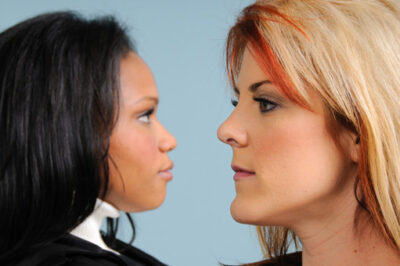The second reason prejudice has such a strong hold is that it is too widely accepted—even in the church. In fact, I believe prejudice is more prevalent in the church than outside it! We’re so exclusive in our denominations that we continue to remain separate.
Prejudice is acceptable in the workplace too. You can’t be in a workplace long before it comes up in one way or another, particularly in casual conversations and often through stories or jokes. But we need to face the fact that prejudice is not funny.
Being Part of the Solution
When we begin to see the prevalence of prejudice, we may feel as if we are so much in the minority that we hesitate to speak up. But if we’re going to stand for Christ, we’re going to have to start objecting when we observe prejudicial attitudes or behavior.
Ephesians 4:15 says that a sign of Christian maturity is to be able to speak the truth in love. As mature believers, we have to get more vocal about the wrong and the sin of prejudice.
The time is fast approaching when we can no longer remain silent. To remain silent is to remain part of the problem. I believe we can, through the Holy Spirit, come to a place of speaking the truth in love and exhibiting zero tolerance for prejudice.
What would happen in our homes and at work, in school lunchrooms, in break rooms—wherever we find ourselves—if we began to practice zero tolerance for prejudice? I don’t think we would get fired if we said, “You know, I’m not comfortable with this conversation” or “I don’t agree with that” or “I really don’t want to hear that” when people are making prejudicial comments.
And we can let our children know we mean zero tolerance by modeling it ourselves and instructing them to do the same. We can teach them to say, when they are playing with other children who display prejudicial behavior, “This is a zero tolerance home. We do not tolerate prejudice in this home.”
If we adopted the attitude of zero tolerance, can you imagine how things would begin to change? This is our opportunity.
We can stand back and resist some things and remain silent, but prejudice is not one of them. It’s too big. It’s going to take an aggressive attack, a proactive attack to make the enemy back off from pitting us against one another.
We’ve got to begin to open our mouths and speak the truth in love. We’ve got to break free. The reason we don’t is that we don’t know one another. When we begin to know one another, we’ll know the stereotypes are not true.
Though prejudice may be natural, like other practices of our flesh nature, it is sin. In our lives it has absolutely no place. In the world it will be present until Christ comes because it is a spiritual problem, and the world lacks the power of the Holy Spirit to overcome it. But Jesus has overcome the world and given us the power to conquer all the works of the enemy.
The biggest obstacle in overcoming prejudice is our questioning who is to blame. We ask, “Where does fault lie in this whole situation?” Particularly if we ourselves are not prejudiced, we resist taking responsibility.
The Bible explains the dilemma. Jeremiah 32:18 says of the Lord, “‘You show love to thousands but bring the punishment for the fathers’ sins into the laps of their children after them.'”
Prejudice may not have originated in our hands, but it’s in our laps. We didn’t initiate it; our parents passed it to us.
But we can be part of the undoing of prejudice. The Bible calls it “rebuilding the ancient ruins.” God didn’t say we’d move on to a new place; He said we can go back and rebuild what is in disrepair. Beloved, in our country and culture, prejudice is the outgrowth of ancient ruins.
What Can We Do?
After I came out of the closet as a victim of childhood abuse a number of years ago, people asked me what they can say to others who have experienced that kind of trauma. I told them, “When someone has gone through a terrible time, the most wonderful thing to hear is simply, ‘I am so sorry that happened to you.'”
I believe we can begin the healing process related to prejudice by saying to one another, “I am so sorry this has happened.” Though prejudice is rampant throughout our culture, we can say we’re sorry for the hatred we have perpetuated.








Leave a Comment
You must be logged in to post a comment.